Is Ninive a restaurant or a shisha spot?
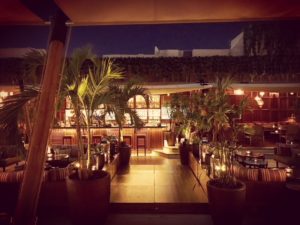 I find it off-putting when restaurants are described as shisha spots. Shisha, as does any smoking, ruins the palate and taste buds – so why would I choose to dine there? The opening of a new home-grown Middle Eastern restaurant with a twist in Dubai is too good an opportunity to miss though, so I make a reservation for a Friday evening with an open mind.
I find it off-putting when restaurants are described as shisha spots. Shisha, as does any smoking, ruins the palate and taste buds – so why would I choose to dine there? The opening of a new home-grown Middle Eastern restaurant with a twist in Dubai is too good an opportunity to miss though, so I make a reservation for a Friday evening with an open mind.
Ninive is an al fresco-only location on the podium terrace of La Cantine du Faubourg (same owner) at Jumeirah Emirates Towers Boulevard and is named after Nineveh, the ancient Assyrian city of Upper Mesopotamia in modern-day northern Iraq – better known as the site for the Hanging Gardens of Babylon, one of the Seven Wonders of the World.
And that’s where the design takes inspiration. Amongst all the foliage, imagine a plethora of majlis-style alcoves with lounge seating – all in warm textures of brass, wood and leather. Ninive is a feast for the eyes (and hopefully the other senses), in a similar manner to long gone Q’bara – one that oozes atmosphere even early on in the evening when quiet. Cleverly, the designers have segregated alcoves for those who want to dine without shisha – and in fact these boast more covers than the central shisha-cum-eating spots – something our friendly Moroccan waiter is keen to point out. He also explains that once summer kicks in, the area will be covered and air-conditioned with a retractable roof. Thank goodness, otherwise an eight-month business plan would be a struggle. We have a waiter who is intuitive, knowledgeable and steers away from upselling – music to my ears 🙂
The chef is Turkish and the cuisine describes itself as Middle Eastern and North African with a focus on Iranian, Iraqi, Egyptian, Turkish and Saudi dishes – but they missed out the many Moroccan dishes on the menu. The beauty of food from this part of the world, in my opinion, is the differing mezze dishes, so we choose four starters and two mains (between two of us), but our waiter insists our order is too much – and we begrudgingly drop one main course. I’ll have to return for the quails.
As it turns out, most of our dishes are Moroccan. A taktouka dip of red pepper, tomatoes, coriander and a hint of chilli is gorgeous spooned into warm, pillowy pitta pockets – but a little too salty. Three filo-pastry parcels of cheese briwat (versions are found across the Arab world) are over-fried, however the filling of walnuts mixed with kashkaval and a goats cheese of some kind gives a crunchy textural twist. I wish restaurants would serve bites likes these in even numbers, making sharing easier. I expect the sardine kwirat ‘meatballs’ in a spiced tomato sauce to be fishier, but mixed with rice, the flavour is refined and delicate.
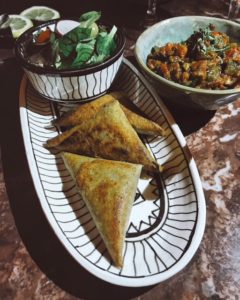
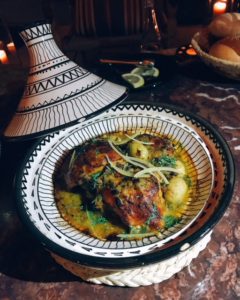
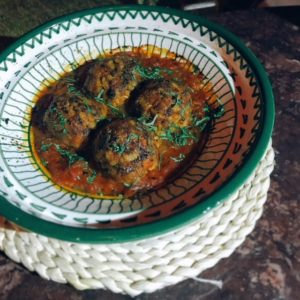 I am unsure of the origin of a barley salad, however mixed with apricots, walnuts, chickpeas, barberries, mint and dates is textural heaven with well-balanced sweet and savoury notes. A portion of Lebanese fatayer arrives complimentary (I am not recognised). The beef, cinnamon, pine seed and raisin pie filling is exquisite, and the freshly fried dough is soft in the centre, with crisply pinched borders.
I am unsure of the origin of a barley salad, however mixed with apricots, walnuts, chickpeas, barberries, mint and dates is textural heaven with well-balanced sweet and savoury notes. A portion of Lebanese fatayer arrives complimentary (I am not recognised). The beef, cinnamon, pine seed and raisin pie filling is exquisite, and the freshly fried dough is soft in the centre, with crisply pinched borders.
On to our main, the meat from the chicken tagine falls off the bone effortlessly, whilst the olive and lemon confit stew is delicious. So much so, I mop up the remains with some pitta. All dishes are beautifully presented in bespoke RAK Ceramics crockery, albeit some are cracked. Our waiter is right, we have ordered too much and are far too full for dessert. The chocolate doughnuts with Turkish coffee ice cream sound appealing for another visit.
The wine list includes some Lebanese wines, with by the glass options too – however the sole faux pax from the service is not pouring it from the bottle in front of us. An AED235 price point based on three dishes each (without alcohol) is a reasonable ask, provided you avoid the lobster and the Wagyu.
Throughout the whole evening, we don’t even catch a whiff of shisha – admittedly we have an early dinner reservation. If Ninive’s strategy with its layout is to target shisha and non-smokers, then their approach works. Apart from a glitch with one dish and the wine serving, Ninive impresses with a mix of traditional and slightly refined Middle Eastern and North African recipes; endearing service; an inviting décor in a top location (literally) with a vibrant ambience; and value for money. It’s the kind of place that I would bring visitors to for a taste of the region’s cuisine. Here’s to a four out of five FooDiva knife rating. I am glad I kept an open mind.
Do you like to dine in restaurants that serve shisha, or do you steer away?
A bientôt.
FooDiva. x





























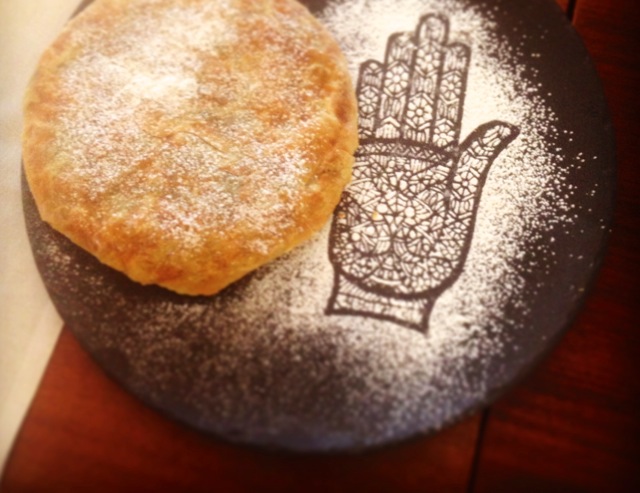


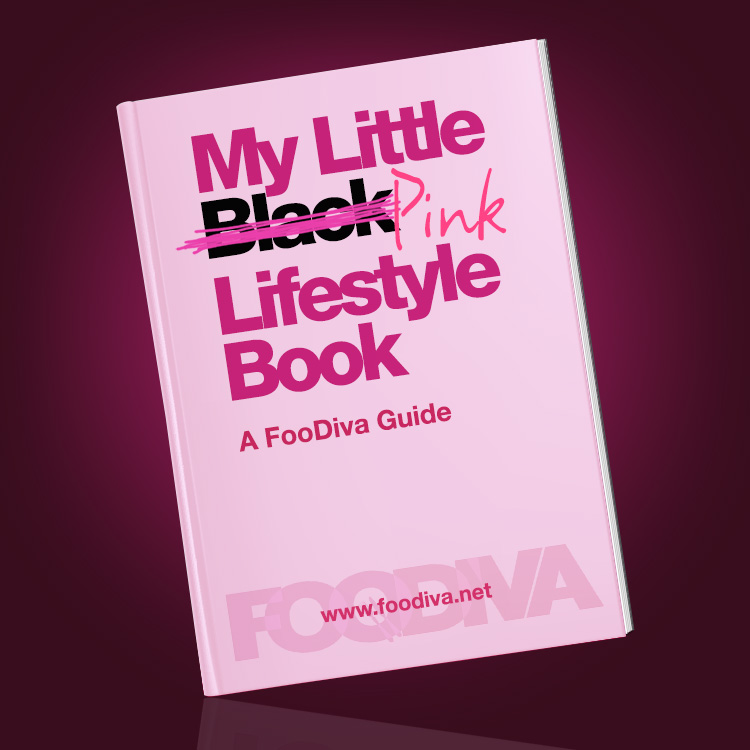






The Hanging Gardens of Babylon – if they existed – were traditionally held to be in the city of Babylon (rather than Nineveh); they’re traditionally, though not necessarily accurately, ascribed to Nebuchadnezzar.
The Assyrian ruler Sennacherib does seem to have built an extensive water garden at Nineveh. Stephanie Dalley’s 2013 book ‘The Mystery of the Hanging Garden of Babylon: An Elusive World Wonder Traced’ does posit that Sennacherib’s gardens in Nineveh might be the basis for the basis of the story of Babylon gardens. However, while Dalley’s scholarship on the topic deserves close study, and should be taken very seriously, this is still an interesting hypothesis rather than a definitive proof; her evidence is primarily textual rather than archaeological. The nature of the precise location and nature of the possibly legendary Hanging Gardens remains elusive.
Oh, right… food blog.
I’m not a fan of Middle Eastern restaurants that allow smoking; shisha or otherwise: http://www.foodiva.net/2014/05/the-purple-haze-of-nay-restaurant/
Though if you can’t detect the smoke, then that would obviously make a significant difference.
Also, why would you name a restaurant after an ancient Assyrian city, and then serve primarily Moroccan food? That’s a bit like naming your restaurant ‘Cuzco’ after the Incan Empire’s Peruvian capital, and then serving primarily Mexican dishes.